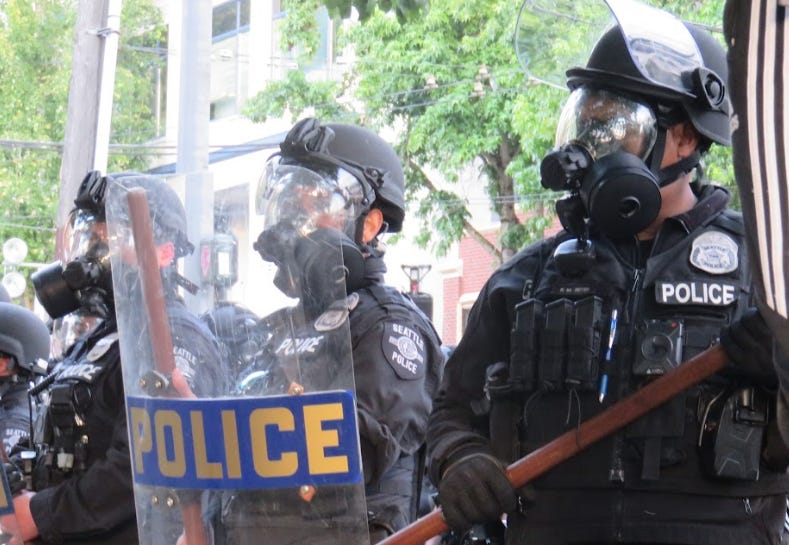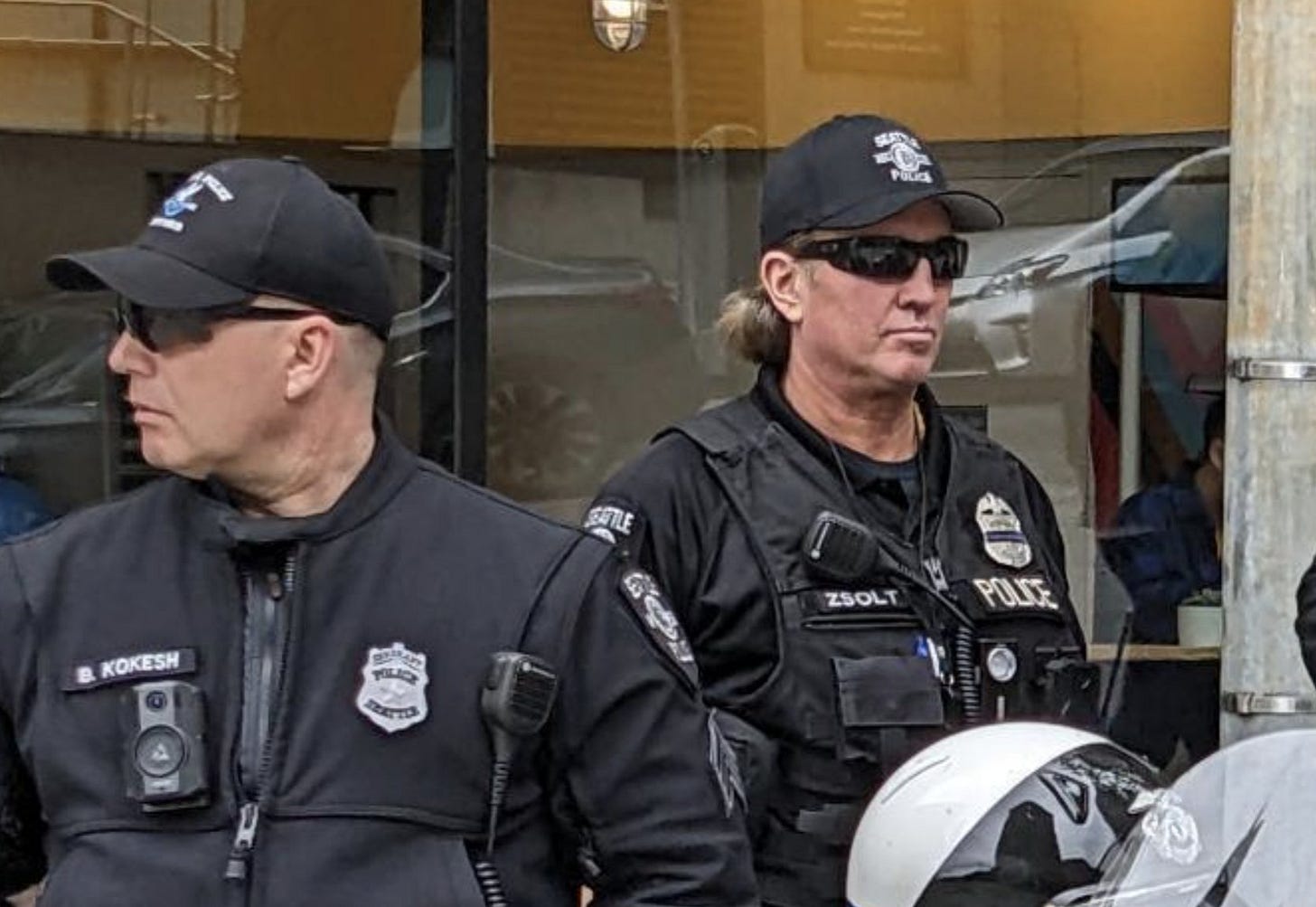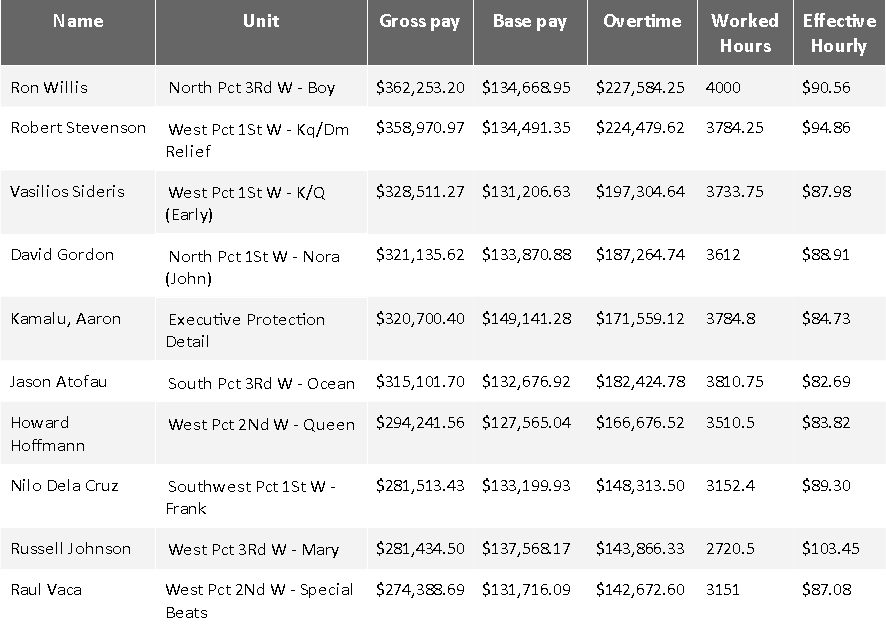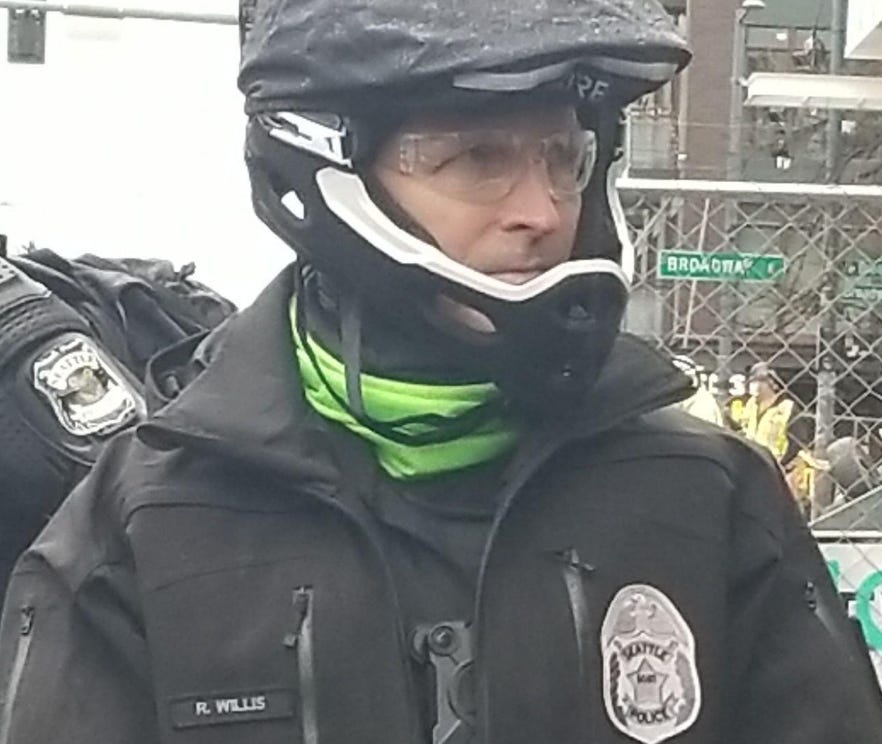Nearly 50 Seattle patrol officers made over $200k last year
High earners include perennial problem cops. Patrol Officer Ron Willis once again raked it in, with $362,000 in gross earnings, including $227,000 in overtime.

Nearly 50 Seattle officers in nonsupervisory roles took home more than $200,000 in gross pay in 2022, according to payroll records obtained by DivestSPD. Six of those officers made more than $300,000, out-earning Chief Adrian Diaz.
Including sergeants, lieutenants, and other management, around 200 officers, or 16 percent, cleared $200,000, and three-fourths of all sworn officers made more than $100,000, which is the median household income for Seattle.
For reference, the median salary of a CEO in the United States is $189,000, according to the Bureau of Labor Statistics.
Overtime for sworn and civilian SPD employees totaled $36.4 million in 2022—$10 million over budget. Many of the big earners were officers at or near retirement age who have maxed out longevity pay. Almost half were hired in the 1990s or earlier.
Once again, the top-earning patrol officer was Officer Ron Willis, who previously drew scrutiny when it was reported that he earned over $400,000 in 2019. Only four other SPD employees—all supervisors—made more than Willis, who took home a whopping $362,253.
According to the payroll data, Willis was reportedly paid for 4,000 hours last year—equal to an effective rate of $90.56 per hour. However, this doesn’t add up.
Officer Willis’ base pay rate is $61.63, which means he would need to work 2,185 hours at regular pay to earn $134,669, and it would take 2,461 hours at a time-and-a-half rate to make $227,584 in overtime.
His payments suggest Willis was paid for 4,646 hours. To reach that many hours, Willis would need to have worked nearly 13 hours every day in 2022 or an average of almost 18 hours daily, assuming a five-day workweek.
A 2021 OPA investigation into Willis’ 2019 overtime payments found that he worked more than 90 hours a week in 15 weeks. For seven consecutive weeks in 2019, Willis allegedly worked between 90 and 123 hours a week. He was also paid for more than 24 hours in a single day on six occasions, which Willis attributed to the guaranteed overtime he received as a field training officer.
In his OPA interview, the 61-year-old Willis claimed that the grueling schedule he ostensibly worked did not affect his performance. He added that he only sleeps four hours nightly.
According to public records, Willis lives an hour away from Seattle in Enumclaw. If what he says is true, Willis is averaging 18 hours of work 260 days a year, commuting two hours round trip, and sleeping four hours with no time for anything else.
Willis was suspended for one day for violating the department’s 90-hour weekly limit. OPA issued an “inconclusive” finding on the allegation of timesheet fraud, arguing that SPD’s sloppy record-keeping prevented them from verifying whether Willis worked all the hours he claimed.
In 2022, Willis was paid for around 500 more hours than in 2019.
Mayor’s emphasis patrols driving overtime costs
While overtime spending is up across the board, emphasis patrols saw the most significant increase. Emphasis patrol overtime has roughly doubled from 8,000 to nearly 16,000 hours in the last year.
This surge in overtime reflects Mayor Bruce Harrell’s efforts to increase the police presence downtown and staffing for special operations that mostly netted petty thieves and small-time drug dealers. Twenty of the 46 officers who made more than $200,000 and half of the top 10 patrol earners in 2022 were assigned to the West Precinct.
General patrol overtime also grew by 14 percent in the last year, as overtime was used to maintain so-called minimum staffing levels. However, only a few of the top earners in patrol worked in other precincts. Five were assigned to the Southwest precinct, and four were respectively assigned to the South and North precincts, including Willis.
A handful of officers in investigative roles, such as traffic, human trafficking, and gang, also made more than $200,000 last year.
Notably, three of Mayor Harrell’s bodyguards took in massive amounts of overtime. Aaron Kamalu, assigned to the executive protection detail, was one of SPD’s highest-paid employees in 2022, with over $320,000 in gross pay. Two other members of the detail—Mark Sagmoen and Brien Escalante—respectively made $216,000 and $247,000.
Big paydays for problem officers
Members of the over-$200,000 club included some officers that made headlines for excessive force and other kinds of serious misconduct.
Autumn Arbogast cleared $222,000 last year. Arbogast has been suspended four times since 2014. She famously flubbed the case of a serial sexual assaulter known as the “Westlake Groper.”
A woman came into the West Precinct with a picture of the man who assaulted her immediately after the incident. Arbogast didn’t take the evidence, forcing the victim to go to Twitter for justice. Officer Arbogast similarly mishandled a hate crime against a gay man in Capitol Hill when she was moved to the East Precinct.
Most recently, Arbogast was suspended for throwing away her department-issued firearm and failing to report it immediately.
Zsolt Dornay, infamous for violent behavior on and off duty, ranked 15th on the list of highest-paid patrol officers, with nearly $255,000, including $125,000 in overtime.
Dornay was taken off the streets and assigned to a desk job in the West Precinct after he slammed a handcuffed prisoner to the ground. The resulting settlement cost the city $160,000. Dornay shot a lawyer in the stomach in an off-duty brawl and was convicted of DUI.
He did donuts in his next-door neighbor’s yard because he thought the man was sleeping with his wife and put a gun to a man’s head in a road rage incident in 1995. In 2003, Dornay and another officer nearly beat a 66-year-old indigenous man to death.
Dornay is currently assigned to a unit that manages commercial security alarms downtown, but he apparently gets overtime by working events. He was recently spotted at this year’s May Day demo.

Though he was terminated in September, Officer Andrei Constantin managed to bring in $213,000 on the way out. Constantin was fired after a Twitter user discovered he posted harassing and inflammatory messages using a pseudonymous Twitter account.
Before his firing, Constantin was suspended twice. In one incident, Constantin smashed a car’s window and failed to report it. OPA recently sustained new allegations over a traffic stop in which Constantin knocked a man unconscious.
Overtime expected to exceed budget again
The Seattle City Council raised SPD’s 2023 overtime budget to $31 million, but the department’s analysts are already projecting overtime pay will surpass that this year. The department plans to use salary savings from unfilled positions to cover it.
After investigating Officer Ron Willis’ massive overtime payments, the OPA recommended an overhaul of SPD’s timekeeping and overtime control, which continues to be messy and vulnerable to abuse.
A 2016 audit revealed massive problems with overtime tracking, but very little progress has been made since then.
Writing in 2021, the Seattle Times described the system:
A 2016 audit of SPD's overtime controls described confusion and inconsistencies in how overtime pay is logged, with little independent monitoring. Hours could be entered into an electronic time sheet or on paper, creating the potential for duplicate payments, the auditor found … All overtime records are kept on paper, making it hard to quickly find and check hours. Supervisors who approve an officer's time sheet don't have access to overtime records. Multiple supervisors could assign overtime to one officer without knowing it.
This jumble of different record-keeping methods has enabled some officers to steal large quantities of time. In the most famous case, Ofc. Michael Stankiewicz was terminated and charged with felony theft after it was discovered that he was paid for 55 days that he didn’t work.
Stankiewicz clocked in on one system and logged himself as out on leave on another. Sergeant Joe Lam used the same method and was paid for 81 unworked hours, but he was not terminated.
The Seattle Times quoted an SPD spokesperson in 2021 who said that the department expected to implement an automated timekeeping system by 2022 but gave no timetable for its implementation and called it a “work in progress.”




The police demand respect but do nothing to earn it. They need to stop acting like gods and serve and protect their communities.